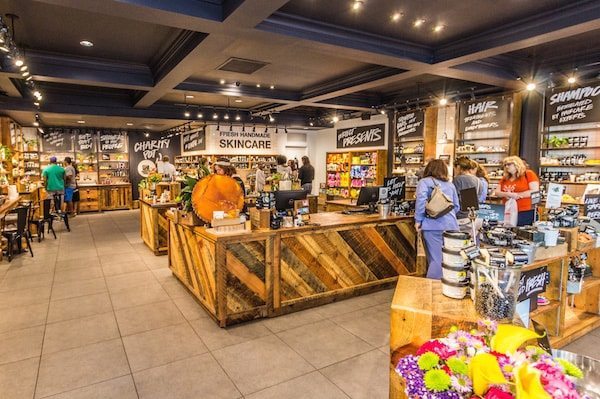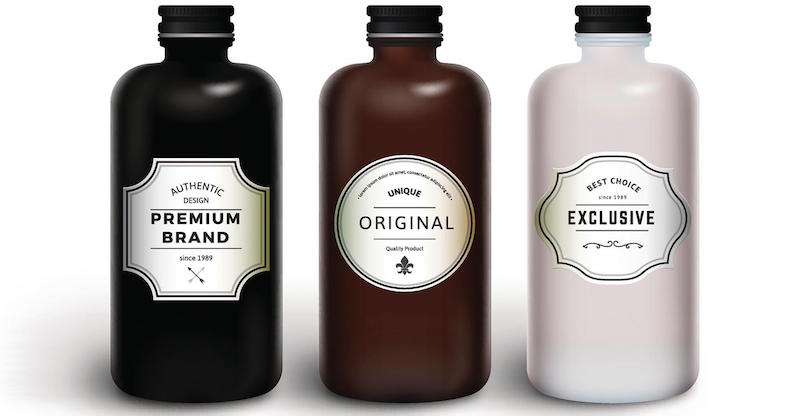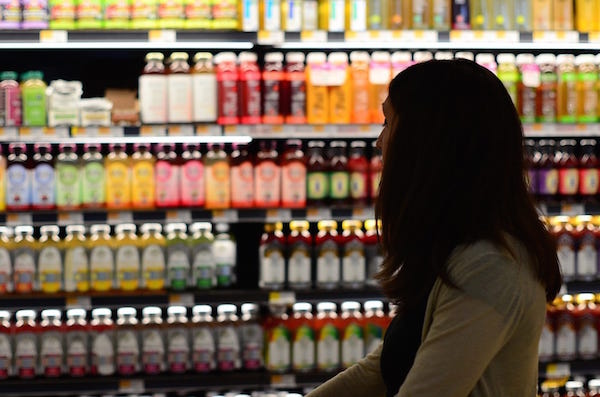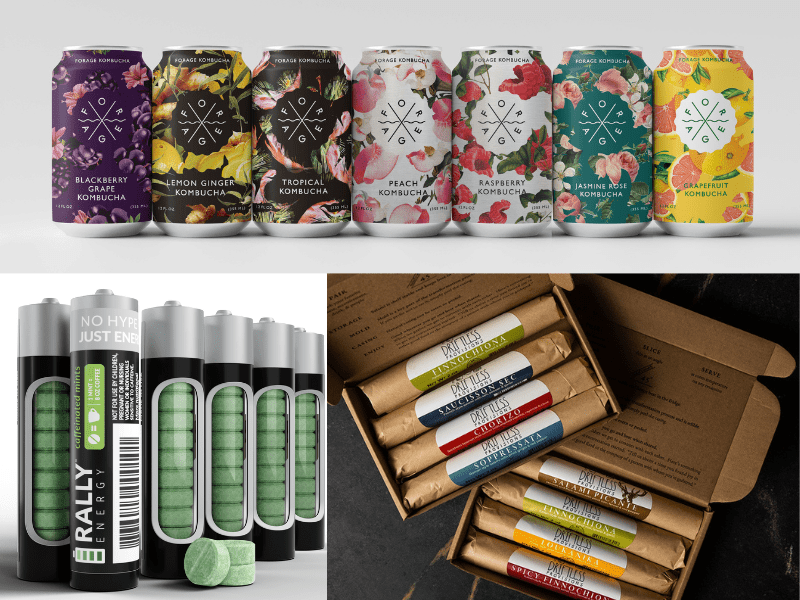Today’s food marketplace is exceptionally busy. The average full grocery store has nearly 40,000 SKUs i.e. products that it offers to consumers. Many food brands are starting to sell through online channels like Amazon or their own online store, sometimes bypassing traditional retail channels altogether. As a result, consumers have more choices than ever about what food they buy and where they buy it. But, it is becoming more difficult and expensive for new food brands to build meaningful relationships with them as the marketplace becomes more saturated.
This market saturation has led every actor in the food business ecosystem to try to capture as much of the value of the consumer relationship as possible, and this includes the marketplace where most consumers get their food: the grocery store. Grocery stores often know what products are trending up or down before the food brands’ management and already have developed deep relationships with their consumers.
This has led grocery stores to introduce their own branded products alongside others that they bring in on their shelves, often referred to as “private label” products. For example, Whole Foods’s private label brand is the 365® Every Value brand and is present in a number of categories in Whole Foods. Private label products are often priced competitively and reflect the grocery store’s detailed knowledge of their target consumer. While private label products’ market share has held steady at about 18% in recent years, private label brands are now growing faster than traditional manufactured food brands.
Matt D’Amour talks on our podcast about how Tribe 9, while it has a strong portfolio of its own brands, leverages its in-house manufacturing capability to co-pack for other businesses, whether for other food brands or for grocery stores that want to produce private label products. One of the most important business model reasons for a manufacturing company like Tribe 9 to pursue producing private label products for stores is to maximize capacity utilization of their factory. Factories make money when they are full and lose money when they are not, and most of the time it takes too long for the sales of one brand to fill up the whole factory. In addition, Tribe 9’s production of other businesses’ products allows them to respond to today’s marketplace to reach the consumer in a variety of ways without having to do the work of brand building all of the time.
Relationships with customers are key to food business growth and survival and building a brand is a great way to build a relationship. However, if food companies have manufacturing capabilities, making private label products can be a valuable part of their business model as they build their customer relationships, maximize production efficiency and diversify revenue streams.
And now, our roundup of the best food and beverage finance news, events and resources from around the web…
Business Model Insights
- Big CPG and mass retail supported each other, but now they’re caught in the same spiral (New Hope Media) – “The no/low growth environment experienced by large-cap food and beverage companies is well-documented. Conventional grocery retail faces considerable challenges as well, particularly from rising online sales. The symbiotic duopoly that for so long governed consumer choice at shelf has fractured. Decades of mutual back-scratching effectively built a competitive moat, but that moat has been breached. Private label is no longer just about cheap but can also be a comprehensive quality and value equation. And it is not just about interesting new private label offerings (Thrive, Brandless, Lucky’s—and watch out for Amazon) but often about private label-driven store banners like Trader Joe’s.”
- Big Food’s Information Gap (Food Dive)
- A CEO’s cheat sheet for managing a board of directors (New Hope Media)

Raising Capital
- Five Factors that Impact Your Business Credit (SBA Blog) – “When it comes to business credit, there’s no standard scoring model for assessing risk. Lenders, suppliers, banks, leasing companies, businesses, and finance companies all use different reports and scoring models. Your company’s business credit report shows banks, lenders, suppliers, vendors, and other businesses how your company handles its financial obligations. The five factors that impact your business credit are: Creditworthiness, Credit Capacity, Capital Invested, Collateral and Company Conditions.”
- 5 ways a crowdfunding campaign could help your startup (New Hope Media)
Investors seek startups that balance health, sustainability and broader supply chain support (Food Navigator USA)
CPG/National Brands
- Does branding really matter? (New Hope Media) – “Your primary medium for communicating with consumers and with investors is your package. Make sure it leaves a good, and strong, impression. Important boxes to check include the traditional three—good price point, good product taste and convenience—but also a fourth, brand and packaging. Have a plan and stick to it, but be adaptable. Stay flexible in terms of categories and channels. Figure out early on who the heavy user of your product is—and how you can find more people like them. Investors look for companies that are ready to scale.”
- How to Start Building and Documenting Your Brand Strategy (Real Food Brands Marketing Podcast)
- Forgotten and unloved brands get a reboot as Big Food looks for untapped growth (FoodDive)

Market Trends
- Report: Online grocery sales will increase 10 times faster than in-store (FoodDive) – “Online grocery sales will increase at 10 times the rate of in-store sales over the next five years. Online food purveyors that utilize a common shipping carrier, like Amazon.com and meal kit companies, will experience slower growth than so-called “in-market” companies that fulfill via direct delivery and store pickup. However, these in-market players also face stiffer competition, with large cities offering an average of ten online grocery options.”
- What does ‘good food’ mean? (New Hope Media)
- More than mileage: Grocers embrace story and transparency in local marketing (FoodDive)
Farming and AgTech
- Organic dairy, like conventional, facing tough times (MOSES) – “With another year of depressed farmgate milk prices looming on the horizon, and several dozen dairy farmers having their worlds turned upside down when told they no longer had a buyer for their milk, many dairy farmers have felt their burning desire for change turn into a raging fire. While organic dairy farmers typically enjoy a much higher pay price compared to their conventional counterparts, they, too, have seen their pay prices being whittled down over the past 18 to 24 months. While pay prices are vastly different even with downward pressure on markets, organic and conventional are basically headed down the same road. Retail sales of organic milk dropped more than 2.5% in the last year while sales of plant-based milk options rose nearly 3%, leaving the organic dairy sector trying to manage oversupply.”
- A Guide to Farm Succession Planning (Compeer Financial)
- How 4 brands push the regenerative envelope (New Hope Media)

Deals/M&A
- The great meal-kit shakeout continues as Kroger plans to buy Home Chef for at least $200 million (Recode) – “A year ago, no meal-kit startups of consequence had gone public or sold to a competitor. As of today, at least five of the startups in the space have, or intend to. The latest: Kroger announced its intent to purchase Chicago-based Home Chef for $200 million up front. The value of the deal could balloon to $700 million over five years if Home Chef hits certain ‘significant growth’ milestones. Home Chef, the third-largest meal-kit company, grew 150 percent in 2017 to $250 million in revenue, Kroger said. The company has historically been unprofitable, but recently posted two quarters in the black.”
- What are VCs looking for in the food, beverage arena? (Smart Brief)
- Merged Bayer-Monsanto will corner the market on farm data and software (Des Moines Register)
Industry Events
- Project Nosh Pitch Slam (Project Nosh) – $, 6/4 – 6/5 in New York, NY
- BevNet Live (BevNet) – $, 6/6 – 6/7 in New York, NY
- Hirshberg Entrepreneurship Institute (Gary Hirshberg) – $, 6/14 – 6/15 in Boulder, CO
- Good Food Pitch Slam (FamilyFarmed) – Free to Apply, 6/19 in Chicago, IL
- FaBcap Pitches & Capstone Keynote (FaB Wisconsin) – $, 6/21 in Milwaukee, WI
- Smart Food Expo (Various Orgs) – $, 6/25 – 6/27 in Chicago, IL
- Expo East (New Hope Media) – $, 9/12 – 9/15 in Baltimore, MD
- ACT Growth and Innovation Summit (Hartman Group) – $, 10/10 in San Diego, CA
- Esca Bona (New Hope Media) – $, 10/22 – 10/23 in Austin, TX





